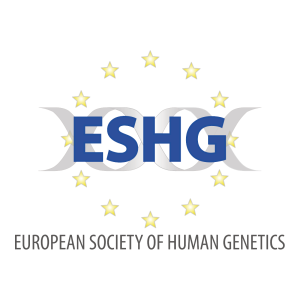

Winners 2022
Fourteenth annual european dna day essay contest for high school students, the winners have been selected.
The European Society of Human Genetics was delighted that students from 22 European countries submitted 167 essays and 23 videos this year. The evaluation was made involving 62 experts in the field, who selected the following 3 winners and 7 honourable mentions .
The names of the winners will be announced in front of more than 4.800 international scientists and doctors attending the European Human Genetics Conference in Vienna on June 14, 2022.
Winners, commendation as well as honourable mentions will receive a diploma within the next weeks. Acknowledgements will be sent to all submitters.
Congratulations to the winners of the 2022 DNA Day Essay contest!
|
Teacher: Claire Surgeoner, The Perse School, Cambridge, United Kingdom
|
|
Teacher: Nicole Copeland, The Perse School, Cambridge, United Kingdom
|
|
|
Teacher: Astrid Edmunds, Wellington College, Crowthorne, United Kingdom
|
|
|
Kaunas Jesuit high school, Kaunas, Lithuania
|
|
Congratulations to the Winners of the 2022 Video Contest
|
International Maarif Schools Of Bucharest, Bucharest, Romania
|
|
|
Arnold O. Beckman High School, Irvine, CA, United States
|
|
|
Liceo classico statale Andrea D’Oria, Genova, Italy
|
|
Congratulations to the Honorable Mentions
Honourable mentions essay contest (in alphabetical order).
|
Teacher: Ebru Ozdogru, Sariyer Doga High School, Istanbul, Turkey
| |
|
Teacher: Andrea Bernacchia, ISS Savoia Banincasa, Ancona, Italy
|
|
| Teacher: Astrid Edmunds, Wellington College, Crowthorne, United Kingdom
| |
|
Teacher: Astrid Edmunds, Wellington College, Crowthorne, United Kingdom
|
|
|
Teacher: Astrid Edmunds, Wellington College, Crowthorne, United Kingdom
|
|
|
The Koc School, Istanbul, Turkey
|
|
|
Scoil Mhuire Buncrana, Co. Donegal, Ireland
|
|
|
Teacher: Tuzun Arik Biyikli, Cagribey Anadolu Lisesi, Ankara, Turkey
|
|
See all winning essays
Honourable mentions video contest (in alphabetical order).
|
Private Ari Anatolian High School, Ankara, Turkey
|
|
|
The Institute of Education, Dublin, Ireland
|
|
|
Private Ari Anatolian High School, Ankara, Turkey
|
|
|
Yeni Yol Anatolian High School, Eski?ehir, Turkey
|
|
|
The English School, Nicosia, Cyprus
|
|
|
Flatrat e dijes High School, Fier, Albania
|
|
|
Narva Pähklimäe gümnaasium, Narva, Estonia
|
|
First Place Winner: EUR 300.- In addition, sponsoring teachers of first place students will receive EUR 1.000.- to organise a science project or to purchase classroom equipment.
Second Place Winner: EUR 200.- In addition, sponsoring teachers of first place students will receive EUR 800.- to organise a science project or to purchase classroom equipment
Special Commendation by the Jury: EUR 100.- In addition, sponsoring teachers of first place students will receive EUR 500.- to organise a science project or to purchase classroom equipment
All participants will receive a certificate of appreciation for their participation in the contest.
Question 2022
‘How can DNA help us to discover ancient human history?’
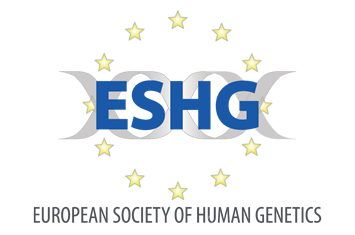
© Copyright 2012 - 2024 | Avada Theme by ThemeFusion | All Rights Reserved | Powered by WordPress
Log in to the ASHG Portal to submit or view your submission.
Welcome to the 2022 DNA Day Essay Contest submission site!
Submission deadline is March 2, 2022 at 11:59 pm U.S. Eastern Time
Submission Instructions
- If you HAVE submitted an essay since 2019, please use these instructions
- If you HAVE NOT submitted an essay in after 2019, please use these instructions
- Review a blank submission form to prepare your submission
What You Need to Know Before You Submit
- Teachers should create an account and submit the essay for each student. This can be any teacher at the current school of the student.
- The contest is open to high school students (grades 9-12) in the U.S. and internationally
- Essays must be in English and no more than 750 words. Word count includes in-text citations, but not reference lists.
- Essays must include at least one reference.
SUBMIT ESSAY HERE
For more information about the ASHG DNA Day Essay Contest, visit the contest homepage .
Questions? Contact us at [email protected]
European essay competition success for Perse students

Sheen Gahlaut and Sneha Goni (both Lower Sixth) delved into DNA as they achieved success in an international biology essay competition.
The Perse students came first and second respectively in the European DNA Day Essay Contest , with both investigating the question ‘How can DNA help us to discover ancient history?’
For their efforts in the competition, organised by the European Society of Human Genetics, Sheen and Sneha received cash prizes, while The Perse was awarded €1,800 to be used for a biology project.
Sheen said: “I just wanted to look into something a bit different outside of school studies, so it’s pretty amazing to have won the competition,” while Sneha commented: “I’m really happy, especially as it’s a topic I didn’t know much about before.”
Both students are considering a career in medicine and were keen to look into a topic in which there is much ground-breaking research taking place.
Sheen said: “I take a mix of A levels – sciences and history – and I’ve always enjoyed doing projects where there’s a combination of subjects.
“I thought it would be interesting to explore how ancient and modern genomes can be used, so I also looked at how we combined them and how they influence each other.
“I started by looking at the more known-about elements, such as gene development and admixture of different species, but I was really interested in the cultural aspect of it and how social norms have been passed on through time.
“The difference between ancient and modern genomes was quite striking. It’s a topic I’d like to keep track of now I know a lot more about the basics behind it.”
Sneha said: “I started off looking at how we can show population migration and admixture, and also disease and the environment people were living in at the time.
“I think it has quite a nice link to how researchers are now talking about whole genome sequencing in medicine and to help determine diseases.”
Published 11 July 2022
Designed by Svelte Design | Built by Highrise Digital
- Privacy Overview
- Strictly Necessary Cookies
- 3rd Party Cookies
This website uses cookies so that we can provide you with the best user experience possible. Cookie information is stored in your browser and performs functions such as recognising you when you return to our website. It helps our team to understand which sections of the website you find most interesting and useful.
You can read our privacy overview here .
Strictly Necessary Cookie should be enabled at all times so that we can save your preferences for cookie settings.
If you disable this cookie, we will not be able to save your preferences. This means that every time you visit this website you will need to enable or disable cookies again.
This website uses Google Analytics to collect anonymous information such as the number of visitors to the site, and the most popular pages.
Keeping this cookie enabled helps us to improve our website.
Please enable Strictly Necessary Cookies first so that we can save your preferences!
Log in to the ASHG Portal to submit or view your submission.
Accessing your essays:
Log in to the ASHG portal through the button on the left side of the screen labeled "Login with ASHG". Your username is the email address associated with your membership
Select "My Reviewing Assignments" from the table on the left side of the screen
- Please read through each essay assigned to you and score them based on the provided rubric - you can find the rubric attached to each of your assigned essays
The goal of Round 2 is to identify the essays which should advance to Round 3 and potentially be awarded a winner or honorable mention prize. Your selection of essays was randomly assigned, and all essays were vetted for quality in Round 1.
Round 2 judging ends on Friday, April 1 at 11:59 pm U.S. Eastern Time .
If you cannot remember your username or password, please contact [email protected] .
Essay Question:
The “Father of Genetics,” Gregor Mendel, was born 200 years ago in northern Moravia (now Czechia). His experiments with pea plants led to observations and conclusions that became fundamental principles of genetic inheritance. These principles include: 1) Each organism has two versions (or alleles) of each gene; 2) One allele is inherited from the mother, and one allele is inherited from the father; 3) Alleles can be dominant or recessive; 4) Genes for different traits are inherited independently from each other. Because of Mendel’s contributions, traits and disorders that are caused by variation in one gene (For Example, Huntington’s disease, Cystic fibrosis) are called Mendelian traits or disorders. There are also complex traits and disorders (For Example, diabetes, hypertension) that are caused by variation in many genes and, often, environmental factors.
- How do Mendel’s discoveries help us understand Mendelian disorders?
- How does the study of Mendelian disorders help us understand complex diseases?
If you have any questions, please contact [email protected] .
+1 (603) 932 7897

Guide to the DNA Day Essay Contest
- Last modified 2024-01-26
- Published on 2022-01-30
Logo Source: American Society of Human Genetics
1. What is the DNA Day Essay Contest?
Introduction: The annual DNA Day Essay Contest is hosted by the American Society of Human Genetics in support of National DNA Day. DNA Day commemorates the completion of the Human Genome Project in April 2003 and the discovery of the double helix of DNA in 1953.
Question : The question for the 2024 DNA Day Essay Contest is:
Many human diseases have a genetic component. Some diseases result from a change in a single gene or even multiple genes. Yet, many diseases are complex and stem from an interaction between genes and the environment. Environmental factors may include chemicals in the air or water, nutrition, microbes, ultraviolet radiation from the sun and social context. Provide an example of how the interplay of genetics and environment can shape human health.
Prizes: $1,000 + $1,000 genetics materials grant for 1st Place Winner
$600 + $600 genetics materials grant for 2nd Place Winner
$400 + $400 genetics materials grant for 3rd Place Winner
$100 each for Honorable Mentions 10 students
2. What is the eligibility and requirements for the DNA Day Essay Contest?
Students : To participate in the DNA Day Essay Contest, students must be high school students in grades 9 to 12 studying in the US and internationally. Essays must be submitted by a teacher/administrator or parents if homeschooled.
Essays: Must be in English and no more than 750 words. Students should use APA or MLA style for citations.
3. What are the reviewers/judges looking for when evaluating a student's works?
|
|
The overall accuracy of the science content | 0-6 |
Use of evidence in support of an argument/answer; essay well-focused on the question/topic selected | 0-6 |
Writing quality (clear thesis, composition, grammar, syntax, spelling) | 0-5 |
References and citations (quality and appropriateness) | 0-3 |
Total Points | 0-20 |
4. How can I stand out in the DNA Day Essay Competition?
Seek reference from past essays:
Even though past essays were written about a different topic, reading past essays will help you discover the standard structure and the pattern of successful essays. Last year, the topic was discussing how the sampling method for DNA research posed bias in genomic findings and questioned its credibility in studying other populations around the world. The full list of winning essays can be found here .
Lea Andrew, a student in Grade 12, who won 1st place in the 2021 DNA Day Essay Contest follows this structure:
Greater morbidity and mortality rates of Covid-19 in minority populations have highlighted continuing health disparities in the US and UK (1,2). Principles and values have been promoted to guide genomic research, recognising as an ethical imperative, that advances should benefit all populations equitably (3-5). Genomics research was initiated by high income countries using samples mainly from individuals of European ancestry. Approximately 16% of the world’s population is accounted for by individuals of European ancestry, but they disproportionately comprise approximately 80% of all genomic study participants (6,7). This imbalance could exacerbate existing health disparities among diverse populations. | The author discusses the current situation of health disparities due to the pandemic, while past genomic research claimed to benefit all populations. Then, the author reemphasizes the question about the imbalance between the European ancestry population and European research participants compared to their percentage of world population. |
Paragraph:
Large-scale genome-wide association studies (GWAS)[…]identified over 55,000 unique genetic regions associated with approximately 5000 diseases/traits have been identified (10). These studies have also led to fine-mapping of potentially causal variants, with insights into mechanisms of diseases such as type 2 diabetes (11). […]In a study of patients undergoing genetic testing for hypertrophic cardiomyopathy (HCM), benign genetic variants, previously categorised as pathogenic for HCM in individuals of European ancestry, were found in healthy individuals, all of whom were of African or unspecified ancestry (12). The study also determined that the inclusion of small numbers of African Americans in control groups would have prevented these misdiagnoses[…] Polygenic risk scores (PRSs) were developed based on GWAS data in order to identify individuals at increased risk for a range of diseases (13-15) These approaches are starting to allow the identification of individuals who could benefit from preventative approaches (16). However, in a recent analysis of the usage and performance of studies that generated PRSs, 67% of the studies used samples exclusively from populations of European ancestry (17). […] | Regarding the point stated above, the student presented the background information about gene research in identifying common diseases; however, she discussed examples where misclassifications of variants were found in diverse populations |
In contrast, genetic studies of individuals of African ancestry, as early as 2005, have been shown to be beneficial for many populations (18,19). Novel variants of proprotein convertase subtilisin kexin 9 (PCSK9), found in individuals of African ancestry, were shown to reduce levels of low-density lipoproteins, which are known to increase risk of coronary heart disease (CHD)(18). This allowed the development of drugs to inhibit PCSK9 function (19). The benefits of these drugs are not limited to African populations as they are effective for populations worldwide. The diverse human populations all have a common African ancestry (9,19). The 1000 genomes project (20), in which whole genomes were sequenced from 2,504 individuals from 26 populations worldwide, confirmed that African populations have the greatest genetic diversity (6,9). Human genomic variation occurred during evolution into population groups separated by ancestry, geography and other environmental factors (9). A recent deep-sequencing study of only 910 individuals of African ancestry found that the resulting pangenome contained approximately 10% more DNA (around 300 million nucleotides) than the current human reference genome (21). Another recent study sequencing 929 genomes from 54 populations worldwide discovered millions of novel variants (22). Thus, the paucity of non-European data used in genomic research greatly restricts the understanding of relationships between disease and genetics and the discovery of novel correlations. | Here the student presented a new argument with examples to show that genetic studies of individuals with African ancestry offer benefit for more population worldwide since human populations all have a common African ancestry. |
Overall, recent studies suggest that genetic variants found in one population should not be assumed to be present in others (23). In order for GWAS to be more useful for non-European populations, inclusion of these populations is needed. Similarly, generation of improved PRSs will require the use of data from populations of similar ancestry.[..]. The Covid-19 pandemic has highlighted that historically underrepresented populations are typically less trusting of health and research systems and therefore less willing to participate in medical studies (3,4). Therefore, as well as including diverse populations in genomic research, a more diverse workforce is needed to encourage involvement of minority populations (3,4). Further education of professionals and the general public about the phenotypic characteristics of disease in diverse populations will also ultimately lead to improved disease diagnosis, genotype-phenotype correlations and medical interventions. | The conclusion ends with an emphasis on the inclusion of a more diverse population of participants in the studies. |
The example shows the essay structure with three parts: an opening, 3-4 body paragraphs, and a closing paragraph. Within the body paragraph, the students presented two opinions: despite discovering multiple diseases using individuals of European ancestry, there were misdiagnoses, as well as the inclusive use of individuals from other origins in research, like those with African ancestry. With that opinion, he provided examples and evidence from credible scholarly articles to strengthen his argument. Then, the author concluded by emphasizing the importance of the topic.
Essay Structure:
- Opening: You can be either creative or straightforward at the beginning. In this section, you provide context about the topic explaining the issue, then you end with a thesis statement. Focus on providing context for the question rather than presenting your opinions.
- Body paragraphs: Depending on how many opinions you have, you can follow this general structure of the introduction sentence, text analysis, and evidence. Make sure not to use the first-person perspective, because this is not a personal essay.
- Conclusion: At the end, you should remind your readers about your written topic and the takeaway from the evidence. You don’t have to present everything again in this conclusion, but just the overview.
Cite the accurate science content and credible source
The DNA Day Essay Contest is about a biology / science topic; therefore, every source and content utilized must be carefully considered and made sure to be of good quality before writing on the paper. Do careful research about the topic. Some credible sources that you can rely on are ProQuest, Nexis Uni, Google Scholar, search engines, Google Books, or your school’s library. In addition to biology and other science textbooks, your school’s library may have access to various academic journals where you can search for information not freely available on the internet; ask your librarian about what is available. Overall, you can use keywords related to your topic to search online for scholarly and peer-reviewed articles, internet resources, or books to set your research context.
There are millions of results on the Internet, and sometimes you may be lost finding the right articles or the right book for a research context. Articles on the Internet are often unreliable, especially when it comes to magazine or newspaper articles. This is because the writers are not credible researchers or scholars in a specific field and frequently intersperse their own opinions with the facts.
There are multiple citation styles (MLA, APA, Chicago, etc.) you can choose from; however, for the DNA Day Essay, you will choose either APA or MLA. Carefully citing your sources shows your respect to the original author and your credibility in writing this research paper.
Don’t fall into these common pitfalls
The DNA Day Essay Contest announced some common pitfalls the judges previously saw across student submissions, let’s take a look and see what they are:
- Focusing too much on details rather than providing a clear overview.
- Overstating the current or future state of the biotechnology field.
- Inaccurate technical language.
- Lack of in-text citations.
- Using outdated references.
- Using too many quotes.
Aralia is an online course platform that connects students and teachers around the world. Our instructors provide students very personalized education while helping them explore areas of personal interest.
Aralia is currently offering DNA Day Essay Contest preparation. Details about the class can be found here .
In addition to academic courses, Aralia offers Academic Enrichment Programs, Research Programs, Competition Preparation, and Art Portfolio Preparation to help students prepare for higher education and refine their skills in academic subjects not available at their school.
In this course, tutors will assist students to complete and submit their thesis from aspects of biology, in combination with research methods, and thesis writing skills. Our tutor has had 4 years of experience in practicing and designing biological research projects for students. He graduated from the College of Notre Dame, and his research direction was cell and molecular biology, evolution, and neuroscience.
- Competitions
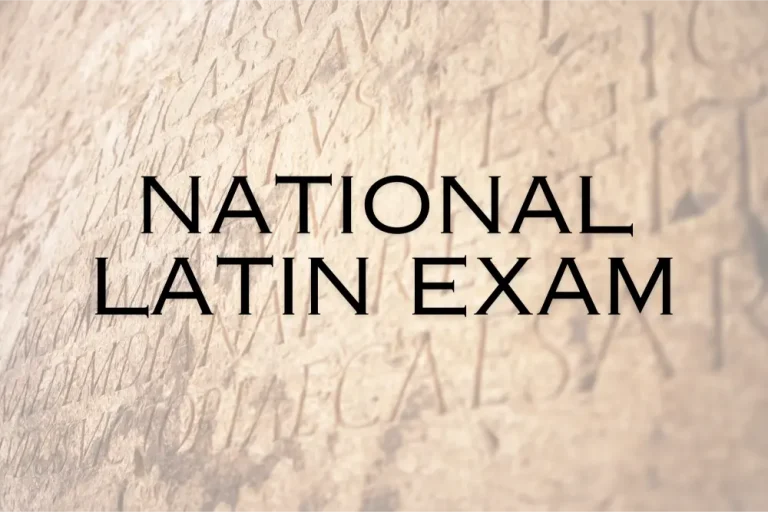
Aralia Education is an innovative online education platform for ambitious middle and high school students worldwide. Aralia’s instructors propel students forward by helping them build a strong foundation in traditional academic courses. They also actively engage and guide students in exploring personal interests beyond their school curriculum. With this holistic approach, Aralia ensures its students are well-prepared for college and equipped for success in their future careers.
- College Accelerator Program
- Comprehensive Introduction to High School
- Academic Empowerment Program
- Test Preparation Bootcamp
- Private Lessons
- Student Awards
Give us a call: +1 (603) 932 7897
Email us: [email protected]
Add us on WhatsApp:

Wellington College

- An Introduction to Wellington
- The Master’s Mission
- Our Purpose, Vision & Attitude
- Our Heritage
- The Wellington Community
- Our Family of Schools
- Inspections
- Leaders & Governors
- Admissions Overview
- Our Selection Criteria
- Joining at 11+
- Joining at 13+
- Joining at 14+
- Joining at 16+
- Visiting Wellington
- Virtual Tour
- Scholarships
- College Fees
- Assistance with Fees
- International Pupils
- Our Learning Philosophy
- Academic Faculties
- Beyond the Classroom
- Fireside Talks
- Examination Results
- Academic Support
- Progress & Reporting
- Universities & Careers
- Digital Learning
- Global Citizenship
- Expeditions & Adventure
- Excellence in Care
- Safeguarding
- Healthy Eating
- Health Centre
- Our House System
- Minibus Service
- The College Shop
- Life Beyond Wellington
- Wellington College Learning Alliance
- Festival of Education
- Grants & Donations
- Easter Revision Course
- Conferences
- Sustainability
- What’s New
- Latest News
- The Master’s Voice
- College Calendar
- Sport Fixtures
- Sport Results
- College Term Dates
- Publications
- Get in Touch
- How to Visit Us
- Where We Are
- Department Contacts
- The Master’s Voice
- Wellington College International
- Parent’s Hub
DNA Day Essay contest 2022
15 July 2022
Latest news
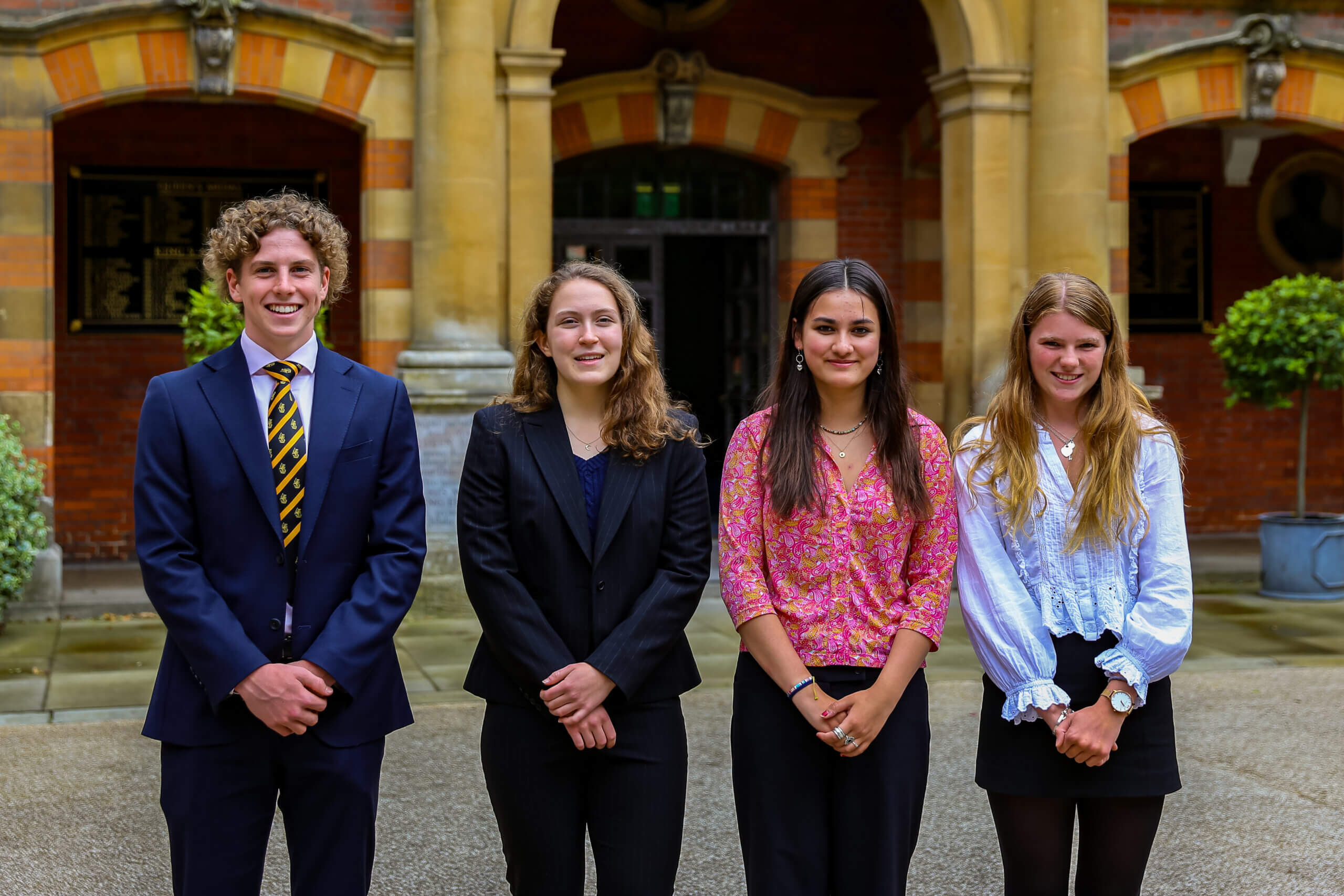
Congratulations to Alicia R T, Charlie G, Anouschka H and Mei Mei W on becoming winners of The European DNA Day Essay contest 2022.
The essay contest is meant as a learning tool and a means to promote knowledge of genetics within Europe. It intends to challenge students to examine, question and reflect on the importance and social implications of genetic research and its applications. Essays are expected to contain substantive, well-reasoned arguments indicative of a depth of understanding of the issues addressed by the selected essay question.
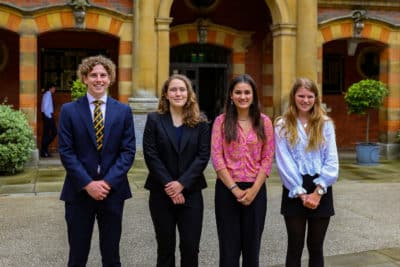
Students from 22 European countries submitted 167 essays and 23 videos this year. The evaluation was made involving 62 experts in the field, who selected 3 winners and 7 honourable mentions.
Alicia achieved third place and Charlie, Anouschka and Mei Mei received honourable mentions.
Click HERE to read the winning submissions.
Share article:
Related news
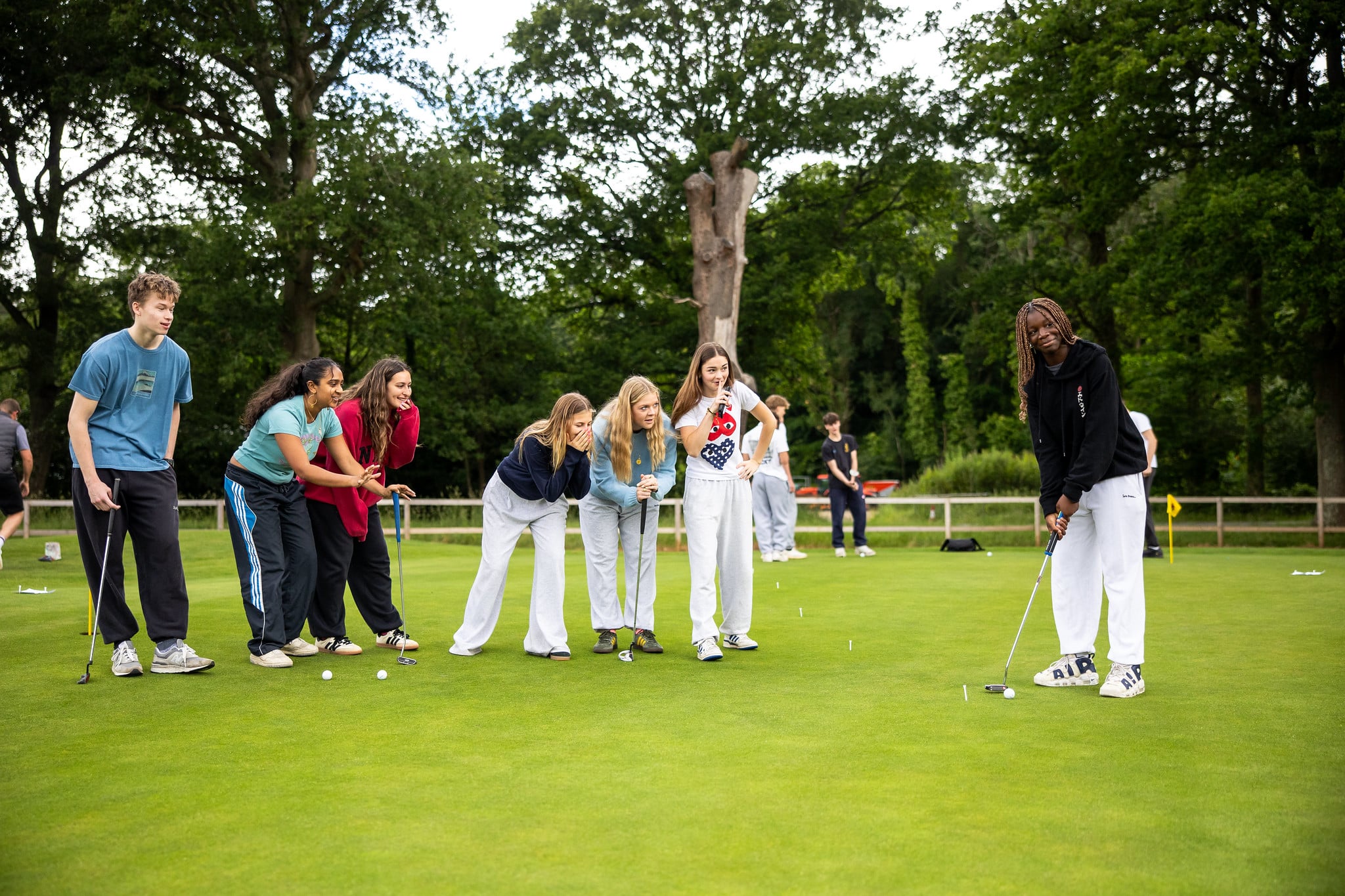
Highlights from the Wellington College Wellbeing Festival 2024

Boughey Run 2024

Celebrating the Achievements of Wellington’s Third Form
Prev article
Next article
News & Events

DNA Day Essay Contest
Ages: High School
Type: Submission
Scope: International
Evelyn Mantegani [email protected] 301-634-7351
Participate
National DNA Day commemorates the completion of the Human Genome Project in April 2003 and the discovery of the double helix of DNA in 1953. Teachers and students around the world are encouraged to celebrate by participating in the American Society of Human Genetics' (ASHG) annual DNA Day Essay Contest! The question each year aims to cover a current topic in genetics that may not be covered in biology class. Students are encouraged to work with their science and language arts teachers. Essays should be 750 words maximum. Winners and honorable mentions are announced on Friday, April 24, 2020.
This contest is open to students in grades 9-12 worldwide and asks students to examine, question, and reflect on important concepts in genetics. Essays are expected to be well-reasoned arguments indicative of a depth of understanding of the concepts related to the essay question.

2020 Question
- Essays must be the product of an individual student's work; group submissions are not permitted .
- All essays must be written in English and are limited to 750 words . Word count includes in-text citations, but does not include reference lists.
- Essay titles are optional and will be counted towards the word limit.
- Word count is best determined by Microsoft Word's count. The submission page will give an official word count when submitters enter the essay.
- Essays should not include a student's name.
- Essays must include at least one reference . References must be clearly documented with both in-text citations and in the references list (the reference list should be separately entered into the "References" section of the submission page). Students may use either APA or MLA style citations. There is no restriction on how many references students may use. However, please keep in mind that students should avoid having too many references, as we want to know the student's opinion on the question and not the opinion of the student's sources.
- Low quality sources = Wikipedia.
- High quality sources = Research journals (for example, from PubMed )
Website: http://www.ashg.org/education/dnaday.shtml
Managing Organization: American Society of Human Genetics
Contact: Evelyn Mantegani [email protected] 301-634-7351
Eligibility: Essays that will be accepted must be submitted by a teacher and written by high school students (grades 9-12) in the U.S. and internationally.
Signup Newsletter
Sign me up for the newsletter!

The Institute of Competition Sciences (ICS) was founded in 2012 to help transform learning into an exciting challenge for all students. We exist to support students in realizing the full potential of their future.
Quick Links
- Competitions
- Privacy Policy
- Terms and Conditions
Connect with us on social media

Copyright © 2024 Institute of Competition Sciences. All rights reserved.
- Architettura e Design
- Arte e Cultura
- Scienza e innovazione
- #coronavirus
- I prossimi eventi
- Segnala un evento
- Prenota uno spazio
- Tutti gli articoli
- Comunicati stampa
European DNA Day essay and video contest: annunciati i vincitori dell'edizione 2022
15th annual european dna day essay and video contest for high school students: chi ha vinto.
Studentesse e studenti degli ultimi due anni delle scuole secondarie di II grado di 22 Paesi europei hanno partecipato all'edizione 2022 del concorso che ogni anno, da quindici anni, viene bandito in occasione del DNA Day : il 25 aprile si ricorda la data ufficiale di pubblicazione del lavoro scientifico con il quale James Watson , Francis Crick , Maurice Wilkins , Rosalind Franklin presentarono per la prima volta la struttura del DNA.
Il tema proposto " How can DNA help us to discover ancient human history? ” è stato sviluppato in 167 elaborati scritti e 23 video . Dieci scuole superiori liguri, con studenti e studentesse affiancati dai propri docenti di Scienze, hanno partecipato alle attività seminariali organizzate dalla Genetica Medica del Dipartimento di neuroscienze, riabilitazione, oftalmologia, genetica e scienze materno-infantili - DINOGMI dell'Università di Genova per promuovere e supportare gli studenti nella partecipazione al concorso .
La Società Europea di Genetica Umana ( European Society of Human Genetics, ESHG ) ha annunciato i nomi dei vincitori del concorso durante la sessione di chiusura dei lavori del congresso annuale della società ( ESHG conference 2022 ) tenutosi a Vienna nel mese di giugno.
Con grande piacere l'Università di Genova, impegnata anche in questa occasione nella formazione e nel supporto ai più giovani, condivide il risultato ottenuto dalle due studentesse Aurora Piccardo e Stella Panavija , classe 4B del Liceo Classico D’Oria di Genova, che hanno ricevuto il terzo premio del video contest . Ad Aurora e Stella le più vive congratulazioni per essersi cimentate in questa esperienza e per l’ottimo risultato raggiunto. Un ringraziamento alla Prof.ssa Anna Barberis , docente di classe delle due studentesse vincitrici, e a tutti gli studenti e le studentesse che si sono preparati al contest partecipando ai seminari proposti da UniGe .
Sul sito DNA Day Contest è pubblicato l'elenco dei vincitori con gli elaborati presentati.
Articoli simili
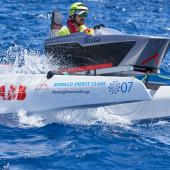
UniGe Elettra: mobilità sostenibile e innovazione alla Monaco Energy Boat Challenge 2024
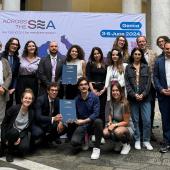
Across the Sea 2024: da 18 Paesi all'Università di Genova per salvare il Mar Mediterraneo

Sistemi meccanici e meccatronici di precisione: dall’ingegnerizzazione alla realizzazione
Nella stessa categoria.
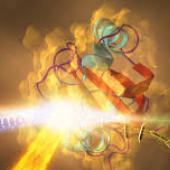
La corsa per l’intelligenza: una lettura di Tomaso Poggio

“I disturbi affettivi nell’era delle neuroscienze: attualità e prospettive": il convegno
- Università di Genova
- universitàdigenova
- mensilmente
- sostenibilità
- coronavirus
- dipartimentodilingue
- intelligenza artificiale
UniGe©2019-2023 - Università di Genova Via Balbi 5, 16126 Genova - Partita IVA: 00754150100 Testata giornalistica online UniGe Life Reg. n°09/2021 al Tribunale di Genova in data 03/08/2021 [email protected]

- Presentación
- Junta directiva
- Comisiones y Delegados
- Para Pacientes
- Noticias AEGH
- Actividades
- Bolsa de trabajo
- Congresos AEGH
- Cursos AEGH
- Jornadas AEGH
- Cursos organizados AEGH
European DNA Day Essay Contest
Dear Genetics Colleagues,
The DNA Day essay contest had a great year in 2014. We had almost 170 essays submitted from 20 countries. This number has grown from about 90 the first year. The “top three” participating countries were Italy, Cyprus and Poland. Some countries participated for the first time, such as Spain and Albania. These 170 essays represent some 140 science classrooms.
For the 8 th year, the European Society of Human Genetics (ESHG) will be sponsoring a DNA Day Essay contest in European high schools as part of International DNA Day activities.
The winners will again be announced on April 25, DNA Day . This should foster the participation of more students/classes, by giving science teachers time to plan this into their curricula for the year. This schedule will allow winning classes to enjoy their prizes and give teachers the opportunity to use the winning essays as a teaching tool.
This year’s themes to be chosen from are:
- Do you think genome sequencing will impact on your future life? Give examples of what you would want and what you would not want to happen because of genome sequencing.
- How can you explain human complexity when we have so few protein coding genes, e.g. about 5,000 less than a cucumber?
Please use the essay contest as means to promote knowledge of genetics in your country and within Europe. The ESHG would also be pleased to learn about other DNA Day activities that you may be hosting in your country; you are welcome to submit these at [email protected] .
On a practical basis, we suggest that you:
o Use existing contacts and “educational partners” from your country to disseminate information on the contest to schools, teachers, principals
o Send a letter to secondary schools in your country, referring them to the DNA Day website ( www.dnaday.eu ), which will have information on this year’s questions/contest directives early in November. Your national genetics society or other organization may also choose to create a website in your county, or provide a link to the ESHG‘s DNA Day site.
o Promote the DNA Day essay contest and other DNA Day activities through radio, television, newspapers and social networking.
We invite you to take a look at the DNA Day website for previous questions, essays, memorable quotes and information on participating countries from contests in previous years: www.dnaday.eu . The contest is open to students ages 15-19, who should submit their essays electronically between November 15 and March 15. Winning essays will be announced via the ESHG website on April 25 as well as at the annual European Society meeting in Glasgow, Scotland, UK in June. The top three essays will be awarded monetary prizes, one for the student and a second for the class/teacher. All students who submit an essay will receive a certification of participation.
Please let us know how the ESHG can help you promote DNA Day!
Yours sincerely,
| Tayfun Ozcelik, M.D. Chairman, Education Committee ESHG | Christophe Cordier, M.S. Genetic Counselor DNA Day Coordinator |
| Helena Kääriäinen, M.D. President, European Society of Human Genetics | |
Información relacionada
Joaquín Dopazo ingresa en la Real Academia Española de Medicina junio 11, 2024

La nueva prueba preventiva que vuelve locos a ricos e influencers mayo 28, 2024
Segunda newsletter de SpadaHC mayo 27, 2024

El Día del ADN en Las tardes de RNE mayo 3, 2024
Deja un comentario Cancelar respuesta
Tu dirección de correo electrónico no será publicada.
Save my name, email, and website in this browser for the next time I comment.
Publicar comentario
Este sitio usa Akismet para reducir el spam. Aprende cómo se procesan los datos de tus comentarios .

- Resumen de privacidad
- Cookies estrictamente necesarias
Esta web utiliza cookies para que podamos ofrecerte la mejor experiencia de usuario posible. La información de las cookies se almacena en tu navegador y realiza funciones tales como reconocerte cuando vuelves a nuestra web o ayudar a nuestro equipo a comprender qué secciones de la web encuentras más interesantes y útiles.
Las cookies estrictamente necesarias tiene que activarse siempre para que podamos guardar tus preferencias de ajustes de cookies.
Si desactivas esta cookie no podremos guardar tus preferencias. Esto significa que cada vez que visites esta web tendrás que activar o desactivar las cookies de nuevo.
The European Society of Human Genetics
- Useful Educational links
Genetics and Medicine Historical Network
Clinical Utility Gene Card
European DNA Day Essay Contest
Clinical Genomics Guide and Quiz App
Genetic Inheritance Quiz App
Patient Information
General Information
Length of program: ESHG currently offers an observership up to 4 weeks in clinical departments or human genetic laboratories from highly regarded European human genetic departments.
Funding: The ESHG offers EUR 2,000 funding to up to 5 candidates to cover travel (including visa) and accommodation. A reduction can be applied if the candidate stays less than 4 weeks (500 euro/ week). The funding will be received by the candidate at the end of the observership after presenting to the ESHG the document offered by the host institution in which the period of the observership is mentioned.
Objectives:
- Gain insight into the day-to-day practice in a human genetics department.
- Participate in grand rounds, seminars or different educational activities.
- Enhance the observers medical and technical skills.
Eligibility criteria:
- The candidate must be a current member of the ESHG.
- The candidate has to have an outstanding resume.
- The candidate must provide proof that they are training in human genetics through a statement from their current University/Hospital supervisor.
- The candidate is eligible to an “ESHG Observership for Young Geneticists” once; if unsuccessful in their application there is no limit to subsequent applications.
- To have a letter of acceptance from the host institution.
Observership Requirements:
- Must be fluent in the English language.
- Must complete the Observership Application.
- Documents to be submitted: 2 page curriculum vitae, 1 page motivation letter, letter of acceptance from the host institution, statement from their current University/Hospital supervisor.
Observers will be responsible to arrange for:
- Finding a host institution that will accept him/her for the observership.
- Accommodation, transportation, food.
- Health and personal safety insurance.
- Obtaining an entry visa if applicable (the host can issue an invitation letter for which you might be asked to indicate personal data, like name, DoB and passport number.
Closing date for applications Tuesday, January 31, 2023
The online application form will be available before the end of December 2022.
Notifications of acceptance are expected to be available by end of February 2023.
We appreciate that the COVID-19 pandemic may impact the plans for this new scheme and will work with the awardees and insitutions to mitigate.
Genetic Education
- Education Committee
- Clinical Genomics and NGS 2024
- Covering The Gaps - The Course You Didn’t Know You Needed
- Other Courses
- IVDR Webinar
- Conference Video Webcast Archive
- ESHG Mentorship Programme
- ESHG Observership Programme
- Educational Resources
- ICHG Initiative
- Information for Patients and Families

Realizing the benefits of human genetics and genomics research for people everywhere.
2022 DNA Day Essay Contest Submission Deadline
ASHG uses cookies to provide you with a secure and custom web experience. Privacy Policy
Get the Reddit app
The Biology Olympiads Reddit is a community that brings together students from around the world for the common purpose - to prepare for the Biology Olympiad. Here you will find various resources and tips on how to prepare for the science competitions.
European DNA Day Video/Essay Contest 2023
16th Annual European DNA Day Essay and Video Contest for High School Students https://www.dnaday.eu/640.0.html
Welcome to all students, teachers and genetics colleagues!
What is the dna day essay contest.
The structure of the DNA double helix was unraveled over sixty years ago! DNA Day, April 25, is now commemorated internationally as a celebration of Genetics and its promises. For the ninth year, the European Society of Human Genetics (ESHG), will be sponsoring a DNA Day Essay contest in European high schools. Once again we will partner with the American Society of Human Genetics in this initiative; using similar essay questions, thus allowing a better assessment of knowledge and perspectives on genetics among students from both continents.
The essay contest is meant as a learning tool and a means to promote knowledge of genetics within Europe. It intends to challenge students to examine, question and reflect on the importance and social implications of genetic research and its applications. Essays are expected to contain substantive, well-reasoned arguments indicative of a depth of understanding of the issues addressed by the selected essay question.
Induced pluripotent stem cells (iPSCs) are a type of pluripotent cells that can be obtained by reprogramming animal and human differentiated cells. Give your opinion on what opportunities this technology should be used for, and what potential applications should be avoided. Support your reasoning with examples.
First Place Winner: EUR 300 In addition, sponsoring teachers of first place students will receive EUR 1.000 to organise a science project.
Second Place Winner: EUR 200 In addition, sponsoring teachers of second place students will receive EUR 800 to organise a science project.
Third Place Winner: EUR 100 In addition, sponsoring teachers of third place students will receive EUR 500 to organise a science project.
All participants will receive a certificate of appreciation for their participation in the contest.
Special Dates
September Submissions opens April 25 Deadline for the submission to the European Society of Human Genetics April 25 DNA DAY Mid June Essay contest winners will be announced

IMAGES
VIDEO
COMMENTS
The structure of the DNA double helix was unraveled seventy years ago. DNA Day, April 25, is commemorated internationally as a celebration of Genetics and its promises.For the 15th year, the European Society of Human Genetics (ESHG), will be sponsoring a DNA Day Essay and Video contest in high schools all over the world.. The essay and video contest is meant as a learning tool and a searches ...
The Winners have been selected! The European Society of Human Genetics was delighted that students from 22 European countries submitted 167 essays and 23 videos this year. The evaluation was made involving 62 experts in the field, who selected the following 3 winners and 7 honourable mentions. The names of the winners will be announced in front of more than 4.800 international scientists and ...
ASHG is proud to support National DNA Day through the Annual DNA Day Essay Contest. DNA Day commemorates the completion of the Human Genome Project in April 2003 and the discovery of the double helix of DNA in 1953. ... 2022, and 2023 are not eligible for equipment grants in 2024. Please Note Text from essays may be used for research purposes ...
Essays are evaluated through three rounds of judging, and every essay is read by a minimum of three judges. Top-scoring essays have typically been scored by a dozen or more judges. Read the 2022 DNA Day Essay Contest Announcement Press Release .
What is the DNA DAY Essay Contest? The structure of the DNA double helix was unraveled over sixty years ago! DNA Day, April 25, is now commemorated internationally as a celebration of Genetics and its promises. For the eighth year, the European Society of Human Genetics (ESHG), will be sponsoring a DNA Day Essay contest in European high schools.
Published: Monday, April 25, 2022, 2:00 p.m. U.S. Eastern Time. Media Contact: Krystal Foster, [email protected] ROCKVILLE, MD - As part of its celebration of National DNA Day, the American Society of Human Genetics (ASHG) announced today the winners of its 2022 DNA Day Essay Contest, which encourages high school students and teachers worldwide to learn about human genetics concepts and apply ...
ESHG DNA Day Essay & Video Contest 2024: The winners are announced. Over 240 submissions in total were received from 29 countries this year and scored in a blinded review by a panel of ESHG members. ... The 2022 impact factor for the European Journal of Human genetics has risen to 5.31 (from 4.26), and is now ranked 35 out of 193 journals in ...
Welcome to the 2022 DNA Day Essay Contest submission site! Submission deadline is March 2, 2022 at 11:59 pm U.S. Eastern Time. Submission Instructions. What You Need to Know Before You Submit. Teachers should create an account and submit the essay for each student. This can be any teacher at the current school of the student.
ESHG DNA Day Essay & Video Contest 2024: The winners are announced ... More information on this year's winners can be found on the DNA Day website www.dnaday.eu. News. News; For Media. 2024 Press Releases; 2023 Press Releases; ... European Society of Human Genetics. Address. ESHG c/o WMA GmbH Alser Strasse 4, 1090 Vienna, Austria
The Perse students came first and second respectively in the European DNA Day Essay Contest, with both investigating the question 'How can DNA help us to discover ancient history?' For their efforts in the competition, organised by the European Society of Human Genetics, Sheen and Sneha received cash prizes, while The Perse was awarded € ...
The goal of Round 2 is to identify the essays which should advance to Round 3 and potentially be awarded a winner or honorable mention prize. Your selection of essays was randomly assigned, and all essays were vetted for quality in Round 1. Round 2 judging ends on Friday, April 1 at 11:59 pm U.S. Eastern Time.
April 25, 2022 DNA Day. 1st Place : Man Tak Mindy Shie, Grade 12. Teacher: Dr. Siew Hwey Alice Tan. School: Singapore International School (Hong Kong) Location: Hong Kong, China. Many would say that the most significant stride in recent genetics has been the completion of the human genome, which laid the basis for studying genetic variation.
The guide to the DNA Day Essay Contest will provide you with a complete guide explaining the contest in detail and how you can stand out in the competition. ... Published on 2022-01-30 ; ... Genomics research was initiated by high income countries using samples mainly from individuals of European ancestry. Approximately 16% of the world's ...
Congratulations to Alicia R T, Charlie G, Anouschka H and Mei Mei W on becoming winners of The European DNA Day Essay contest 2022. The essay contest is meant as a learning tool and a means to promote knowledge of genetics within Europe. It intends to challenge students to examine, question and reflect on the importance and social implications ...
Essays should be 750 words maximum. Winners and honorable mentions are announced on Friday, April 24, 2020. This contest is open to students in grades 9-12 worldwide and asks students to examine, question, and reflect on important concepts in genetics. Essays are expected to be well-reasoned arguments indicative of a depth of understanding of ...
Renewals for 2024 are now open to all individuals in European and non-European countries. News. Current News in the fields of Human and Medical Genetics. ESHG 2024. ESHG 2024 is planned as a hybrid conference in Berlin, Germany, from June 1-4. ... ESHG DNA Day Essay & Video Contest 2024: The winners are announced ...
Join our celebrations and happy DNA Day on April 25! ASHG Essay Contest Winners' Announcement. Mark your calendars: the big announcement of the 2022 winners and honorable mentions will be made at 12:00pm Eastern Time on Monday, April 25! Read the winning essays and see where in the world submissions come from on the DNA Day results page.
15th Annual European DNA Day Essay and Video Contest for High School Students: chi ha vinto? Studentesse e studenti degli ultimi due anni delle scuole secondarie di II grado di 22 Paesi europei hanno partecipato all'edizione 2022 del concorso che ogni anno, da quindici anni, viene bandito in occasione del DNA Day: il 25 aprile si ricorda la data ufficiale di pubblicazione del lavoro ...
16thAnnual European DNA Day Essay and Video Contest for High School Students. Evolution of the DNADay Essay Contest 2008 ØInvitation fromASHG to partnerwiththemin DNADay ... Evolution of the DNADay Essay Contest 2019 => 4 videos 2021 => 13 videos 2022 => 24 videos 2023 => 13 videos 118 90 136 130 266 194 163 276 189 244 122 229 0 194 167 158 ...
The DNA Day essay contest had a great year in 2014. We had almost 170 essays submitted from 20 countries. This number has grown from about 90 the first year. ... (ESHG) will be sponsoring a DNA Day Essay contest in European high schools as part of International DNA Day activities. The winners will again be announced on April 25, ...
Gain insight into the day-to-day practice in a human genetics department. ... The online application form will be available before the end of December 2022. ... European Society of Human Genetics. Address. ESHG c/o WMA GmbH Alser Strasse 4, 1090 Vienna, Austria ZVR: 1086789529.
2022 DNA Day Essay Contest Submission Deadline. February 24, 2022. Previous. Next. Deadlines and Events. May ASHG Journal Club. May 8, 2024. ASHG Professional Awards Application Deadline. May 9, 2024. Member Housing Opens. May 13, 2024. More Join or Renew Today. Join/Renew . Popular on ASHG. Building Blocks of the Genetic Code.
DNA Day, April 25, is now commemorated internationally as a celebration of Genetics and its promises. For the ninth year, the European Society of Human Genetics (ESHG), will be sponsoring a DNA Day Essay contest in European high schools. Once again we will partner with the American Society of Human Genetics in this initiative; using similar ...